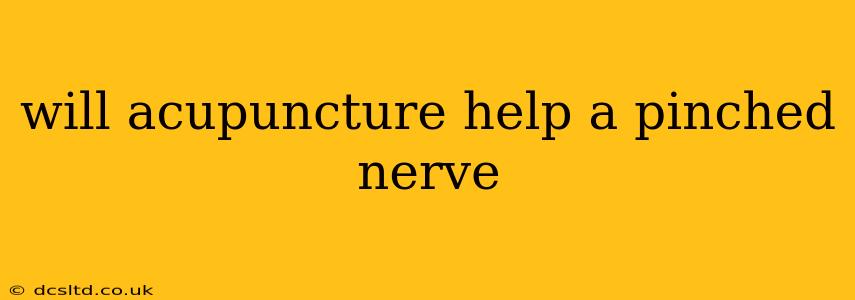A pinched nerve, also known as a compressed nerve, occurs when surrounding tissues, such as bones, muscles, or ligaments, put pressure on a nerve. This pressure can cause pain, numbness, tingling, weakness, or other uncomfortable sensations radiating down the affected limb. Many seek alternative therapies like acupuncture to alleviate these symptoms. But does acupuncture truly help a pinched nerve? Let's delve into the research and explore the potential benefits and limitations.
What is Acupuncture and How Does it Work?
Acupuncture is a traditional Chinese medicine technique involving inserting thin needles into specific points on the body. These points, known as acupoints, are believed to lie along meridians, or energy pathways. The precise mechanism of acupuncture's action isn't fully understood, but theories suggest it may influence the nervous system, releasing endorphins (natural pain relievers), and reducing inflammation. While research is ongoing, many people report significant pain relief from acupuncture treatment.
Can Acupuncture Relieve Pinched Nerve Pain?
The effectiveness of acupuncture for pinched nerves is a subject of ongoing debate and research. Some studies show promising results, indicating that acupuncture may offer pain relief and improved function for individuals suffering from pinched nerves in the neck, back, and other areas. These studies often report a reduction in pain intensity and an improvement in range of motion.
However, other studies have yielded less conclusive results, highlighting the need for more robust, large-scale research to definitively establish the efficacy of acupuncture for pinched nerve treatment. The variability in study designs, participant populations, and acupuncture techniques makes it challenging to draw universal conclusions.
What are the Potential Benefits of Acupuncture for Pinched Nerves?
While definitive conclusions require further research, the potential benefits of acupuncture for pinched nerves include:
- Pain reduction: Many individuals report significant pain relief after acupuncture sessions. This pain reduction may be due to the release of endorphins and other neurochemicals that modulate pain signals.
- Improved range of motion: By reducing muscle spasms and inflammation, acupuncture may contribute to improved flexibility and range of motion in the affected area.
- Reduced inflammation: Some studies suggest that acupuncture can modulate the inflammatory response, potentially contributing to healing and pain relief.
- Improved sleep: Chronic pain associated with pinched nerves can disrupt sleep. Acupuncture's relaxing effects may help improve sleep quality.
- Complementary therapy: Acupuncture can serve as a complementary therapy alongside conventional medical treatments, such as physical therapy or medication, potentially enhancing overall treatment outcomes.
What are the Side Effects of Acupuncture?
Acupuncture is generally considered safe when performed by a licensed and experienced practitioner. However, potential side effects can include minor bleeding, bruising, or discomfort at the needle insertion sites. These side effects are typically mild and temporary. It's crucial to choose a qualified acupuncturist who follows sterile techniques.
Does Acupuncture Cure a Pinched Nerve?
It's important to emphasize that acupuncture is not a cure for a pinched nerve. While it may offer significant pain relief and improve function, it doesn't address the underlying cause of the nerve compression. Treating the underlying condition, such as correcting posture, addressing muscle imbalances, or managing underlying medical conditions, is crucial for long-term relief. Acupuncture should be considered a complementary therapy, not a replacement for conventional medical care.
How Often Should I Get Acupuncture for a Pinched Nerve?
The frequency of acupuncture treatments varies depending on the individual's condition, response to treatment, and the acupuncturist's recommendations. Some individuals may require weekly sessions, while others may benefit from less frequent treatments. An individualized treatment plan is usually developed to address specific needs.
Is Acupuncture Covered by Insurance?
Insurance coverage for acupuncture varies widely depending on the insurance provider and the specific plan. Some insurance plans cover acupuncture treatments, while others do not. It's essential to check with your insurance provider to determine your coverage before seeking treatment.
What are Other Treatments for a Pinched Nerve?
Besides acupuncture, several other treatments can help manage pinched nerve pain, including:
- Physical therapy: Exercises and stretches to improve strength, flexibility, and posture.
- Medication: Over-the-counter pain relievers (NSAIDs) or prescription medications to reduce pain and inflammation.
- Steroid injections: Injections of corticosteroids to reduce inflammation around the nerve.
- Surgery: In rare cases, surgery may be necessary to relieve pressure on the nerve.
In conclusion, while acupuncture may offer significant pain relief and improved function for individuals with pinched nerves, it's not a standalone cure. It's crucial to consult with a healthcare professional to determine the appropriate treatment plan for your specific condition. Combining acupuncture with conventional medical treatments might provide a holistic approach to managing pinched nerve pain. Always seek advice from your doctor or a qualified healthcare professional before starting any new treatment, including acupuncture.
